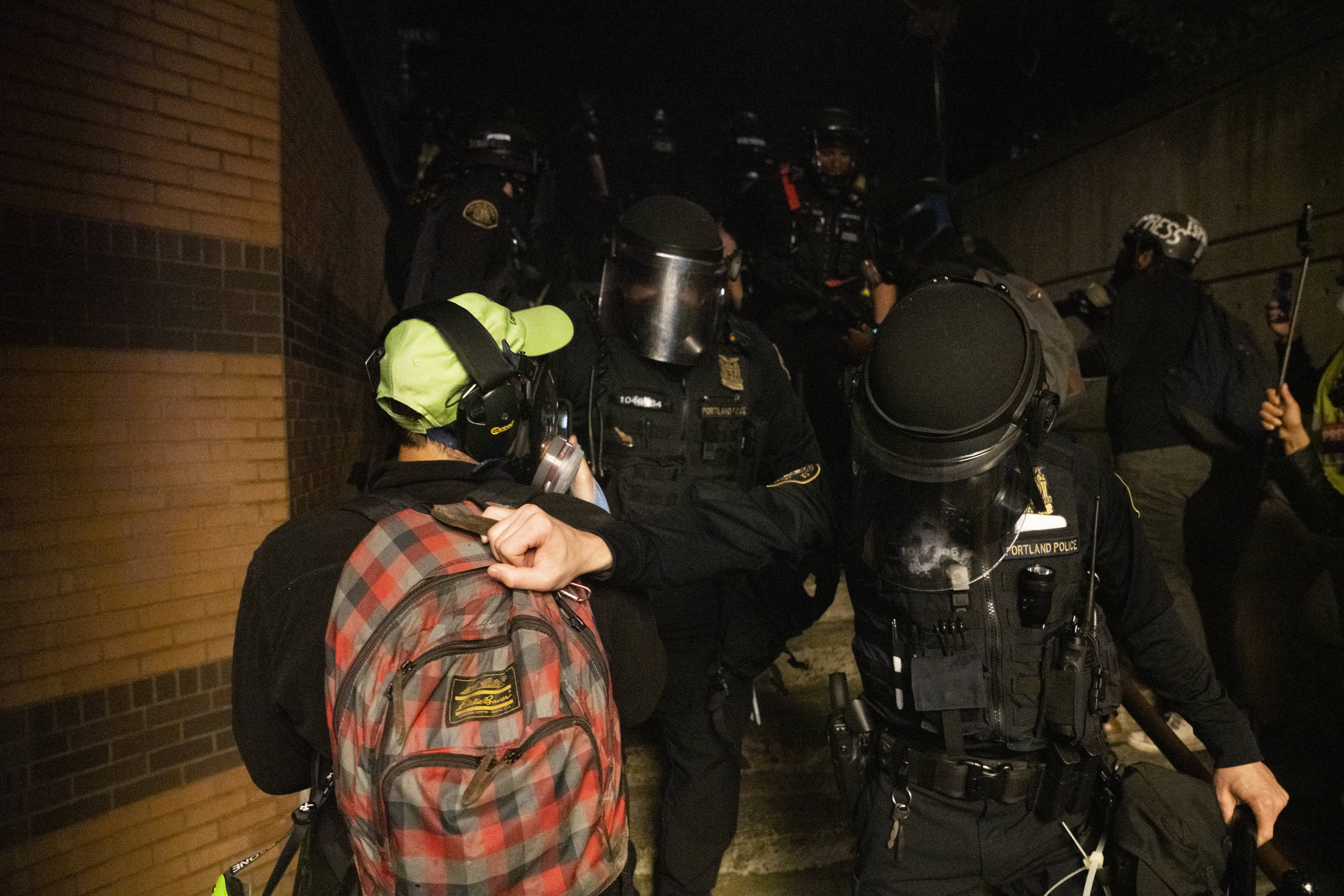
A Portland police officer pushes a National Lawyers Guild legal observer at a recent protest.
Jonathan Levinson / OPB
With less than two weeks until Election Night, Portland City Commissioner Jo Ann Hardesty is pushing to place stringent restrictions on the 56 Portland police officers who remain federally deputized.
Despite the city’s request, the U.S. Department of Justice has refused to end the federal deputation of local officers, who were deputized ahead of a far-right rally in September. Portland Mayor Ted Wheeler has since barred these officers from making arrests under federal law, but some remain concerned about what could happen on Election Night with the DOJ insisting that local officers patrolling the demonstrations have the ability to bring federal charges against protesters.
On Wednesday, Hardesty will introduce a resolution to the City Council that would limit the authority of these officers, who make up most of the bureau’s Rapid Response Team, the unit responsible for responding to protests. If passed, the rule would place new restrictions on who the deputized police can take orders from and communicate with during demonstrations.
“Building on the mayor’s order to take no further action of any kind pursuant to the federal deputation, I am proposing a resolution that creates safeguards to further ensure these deputized officers remain under local control and protect Portlanders from being charged with bogus federal charges,” she said in a statement.
Hardesty’s resolution would double down on the mayor’s attempt to nullify the effects of the deputation. Wheeler, who is also the police commissioner, had issued an order “to take no further action of any kind pursuant to the federal deputation.” Hardesty’s resolution echoes that language and forbids officers from making arrests under federal law. It also forbids the deputized Portland police officers from taking orders related to demonstrations or crowd control from a federal official or federally deputized state official. That would include the roughly 50 Oregon State Police troopers who were federally deputized in August.
The resolution carves out an exception. If the governor takes control of PPB as she did in advance of September’s far-right rally, then local police would be able to take commands from deputized law enforcement.
The resolution would also require any order handed down to a deputized PPB officer by a federal official or deputized state official to be reported to the City Council. Once again, an exception is carved out if the governor has taken command of PPB.
And, unless given permission by the police chief or the police commissioner, deputized Portland police would not be allowed to “communicate or cooperate for purposes of crowd control or responding to demonstrations” with any official from the U.S. Marshals Service or the Federal Protective Service.
The 56 officers have been deputized since Sept. 26 as part of the law enforcement response to a Proud Boys rally in North Portland. Despite the city withdrawing its consent, the DOJ has refused to end the designation, arguing the special status is necessary to protect officers who they maintain are not getting enough support or protection from City Hall.
In a statement, Hardesty said she believed the deputations were a way for law enforcement to trample on protesters' rights and go around the newly elected Multnomah County District Attorney Mike Schmidt, who has declined to prosecute low-level charges against protesters.
“The deputation of the 56 Rapid Response Team officers is a clear attempt by the federal government to take over our local police force, circumvent DA Schmidt’s protest arrest policy, and threaten everyone’s right to free speech and assembly,” she wrote. “I have made clear that as long as these officers are deputized they should not respond to protests.”
She’s not alone. Commissioner Chloe Eudaly had also called for the deputized officers not to police the nightly protests.

